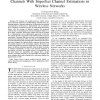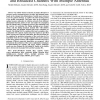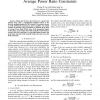34 search results - page 2 / 7 » Capacity Results for Block-Stationary Gaussian Fading Channe... |
ICT
2004
Springer
14 years 1 months ago
2004
Springer
— In this paper we determine bounds of the capacity region of a two-user multipleaccess channel with Rayleigh fading when neither the transmitters nor the receiver has channel st...
INFOCOM
2007
IEEE
14 years 2 months ago
2007
IEEE
— We propose the quality-of-service (QoS) driven power allocation schemes for parallel fading channels when considering imperfect channel estimations. In particular, the parallel...
JSAC
2006
13 years 7 months ago
2006
In mobile wireless networks, dynamic allocation of resources such as transmit powers, bit-rates, and antenna beams based on the channel state information of mobile users is known t...
ICC
2007
IEEE
14 years 2 months ago
2007
IEEE
— We address a lifetime maximization problem for a single-hop wireless sensor network where multiple sensors encode and communicate their measurements of a Gaussian random source...
CISS
2008
IEEE
13 years 9 months ago
2008
IEEE
Zheng and Tse have shown that over a quasi-static channel, there exists a fundamental tradeoff, known as the diversity-multiplexing gain (D-MG) tradeoff. In a realistic system, to ...



